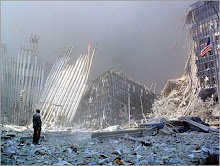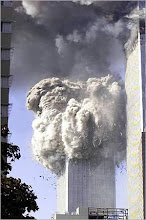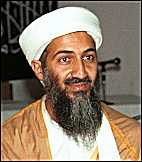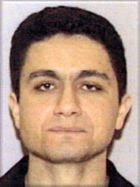
The New York Times revealed the existence of a 78-minute audiotape of radio transmissions of the New York Fire Department (FDNY), which proves that at firefighters reached the 78th floor sky lobby of the South Tower.
Other firemen were close by on another stairway. Lt. Joseph G. Leavey is heard saying: "Orio, we're on 78 but we're in the B stairway.
For over the year the Port Authority of New York and New Jersey with the blessing of the U.S. Justice Department refused to release the contents of the tape. In August of 2002, excerpts from Chief Palmer and others were released. In early November of 2002, the entire tape was released to the New York Times, then to other unspecified "news outlets" (according to the Associated Press).
Two firemen, who braved their way to the 78th floor of the South Tower to report that the fires were minor. Listen to Battalion Chief Orio J. Palmer, who was organising the evacuation of injured people with Fire Marshal Ronald P. Bucca.
Seven minutes before the collapse, Battalion Chief Palmer is heard to say “we've got two isolated pockets of fire. We should be able to knock it down with two lines."
The fact that veteran fire-fighters showed no sign of fear or panic, and had a coherent plan for fighting the fire, contradicts the official explanation of the collapses that the fires were so hot and extensive that they weakened the steel structure.
How could these firefighters and the “Woman at the Gash” WTC1 be at the centre of fires so intense that they fatally damaged structural steel over entire floors of the towers?
Why did the BBC miss this telling evidence?
Excerpts from ‘Firefighters’ WTC Tape on 9/11 [Link]
http://www.thememoryhole.org/911/firefighter-tape-excerpts.htm
Sound clips and transcripts [Link]
http://www.wnyc.org/news/articles/7869
Listen to the entire tape MP3 or WMA downloads [Link]
http://www.thememoryhole.org/911/firefighter-tape.htm
New York Times article [Link]
http://query.nytimes.com/gst/fullpage.html?res=9905EEDE1531F93AA35752C1A9649C8B63
Review of issue at 911Research [Link]
http://911research.wtc7.net/wtc/evidence/audiotape.html
Very detailed and revealing report of the finding of the tape and the struggle to get it released: [Link]
http://911research.wtc7.net/mirrors/guardian2/wtc/firefighters.htm
An attempt to uncover the truth about September 11th 2001
Excerpts From Firefighters' WTC Tape on 9/11.
For well over a year, the Port Authority of New York and New Jersey refused to release the audiotape of firefighters' communications from the World Trade Center during the September 11 attacks. In early November 2002, the tape was released to the New York Times, then to other unspecified "news outlets" (according to the Associated Press). To my knowledge, the NYT is the only outlet to post excerpts from the tape; no one has yet posted the entire thing.
Below are transcripts of all portions that have been released.
9:25 a.m.
Ladder 15: "Go ahead, Irons."
Ladder 15 Irons:
"Just got a report from the director of Morgan Stanley. 78 seems to have taken the brunt of this stuff, there's a lot of bodies, they say the stairway is clear all the way up, though."
Ladder 15: "Alright, ten-four Scott. What, what floor are you on?"
Ladder 15 Irons: "Forty-eight right now."
Ladder 15: "Alright, we're coming up behind you."
9:31 a.m.
Battalion Seven Aide: "Battalion Seven, you want me to relay?"
Ladder 15: "Yeah, Steve tell Chief Palmer they got reports that there's more planes in the area, we may have to back down here."
Battalion Seven Aide: "Ten-four." "Seven Alpha to Seven."
Battalion Seven: "Steve. Seven to Seven Alpha."
Ladder 15: "Fifteen to 15 Roof." "Fifteen Roof."
Ladder 15: "We got reports of another incoming plane. We may have to take cover. Stay in the stairwell."
Ladder 15 Roof: "Ten-four."
Ladder 15: "Fifteen to 15 Roof. That plane's ours. I repeat. It's ours. What floor are you on, Scotty?"
Ladder 15 Roof: "Fifty-four."
Ladder 15: "Alright. Keep making your way up. We're behind you."
Ladder 15 Roof: "Ten-four."
9:37 a.m.
Ladder 15 Lieutenant: "Tommy, listen carefully. I'm sending all the injured down to you on 40. You're going to have to get 'em down to the elevator. There's about 10 to 15 people coming down to you."
Ladder 15 Firefighter: "Okay."
Ladder 15 Lieutenant: "Ten civilians coming down. Fifteen to OV."
Ladder 15 Firefighter: "Got that, I'm on 40 right now, Lieu."
9:39 a.m.
Ladder 15 Lieutenant: "Alright Tommy, when you take people down to the lobby, try to get an EMS crew back."
Ladder 15 Firefighter: "Definitely."
9:43 a.m.
Battalion Seven Chief: "Battalion Seven to Ladder 15 Roof, what's your progress?"
Ladder 15 Roof: "Sixty-three, Battalion."
Battalion Seven Chief: "Ten-four."
Battalion Nine Chief: "Battalion Nine to Battalion Seven."
Battalion Seven Chief: "Go ahead Battaltion Nine."
Battalion Nine Chief: "Orio, I couldn't find a bank to bring you up any highter. I'm on the 40th floor, what can I do for you?"
Battalion Seven Chief: "We're going to have to hoof it. I'm on 69 now, but we need a higher bank, kay."
Battalion Nine Chief: "What stairway you in Orio?"
Battalion Seven Chief: "The center of the building, boy, boy." "Tac One to Tac One Alpha."
Battalion Seven Chief: "Battalion Seven to Ladder 15 Roof, what floor?"
Battalion Nine Chief: "Battalion Nine to Battalion Seven."
Battalion Seven Chief: "...Battalion Nine."
Battalion Nine Chief: "Orio, I'm going to try and get a couple of CFRD engines on the 40th floor so send any victims down here, I'll start up a staging area."
Battalion Seven Chief: "...find a fireman service elevator close to 40, if we get some more cars in that bank, we'll be alright."
9:48 a.m.
Ladder 15: "Battalion Fifteen to Battalion Seven."
Battalion Seven: "Go Ladder 15."
Ladder 15: "What do you got up there, Chief?"
Battalion Seven Chief: "I'm still in boy stair 74th floor. No smoke or fire problems, walls are breached, so be careful."
Ladder 15: "Yeah Ten-Four, I saw that on 68. Alright, we're on 71 we're coming up behind you."
Battalion Seven Chief: "Ten-four. Six more to go."
Ladder 15: "Let me know when you see more fire."
Battalion Seven Chief: "I found a marshall on 75."
9:49 a.m.
Ladder 15: "Fifteen to 15 OV. Fifteen to 15 OV. "Fifteen OV."
Ladder 15: "Tommy, have you made it back down to the lobbby yet?"
Ladder 15 OV: "The elevator's screwed up."
Ladder 15: "You can't move it?"
Ladder 15 OV: "I don't want to get stuck in the shaft."
9:50 a.m.
Ladder 15: "Alright Tommy. It's imperative that you go down to the lobby command post and get some people up to 40. We got injured people up here on 70. If you make it to the lobby command post see if they can somehow get elevators past the 40th floor. We got people injured all the way up here."
Battalion Seven Aide: "Battaltion Seven Alpha to Seven."
Battalion Seven Chief: "Go Steve."
Battalion Seven Aide: "Yeah Chief, I'm on 55, I got to rest. I'll try to get up there as soon as possible."
Battalion Seven Chief: "Ten-four."
9:50 a.m.
"Anybody see the highway one car? Highway one car we need it for an escort to the hospital for a fireman."
Battalion Seven Chief: "Battalion Seven to Ladder 15." "15 Irons."
Ladder 15: "Fifteen to 15 Roof and Irons."
Battalion Six Chief: "Battalion Six to command post."
9:52 a.m.
Battalion Seven Chief: "Battalion Seven to Battalion Seven Alpha." "Freddie, come on over. Freddie, come on over by us."
Battalion Seven Chief:
"Battalion Seven ... Ladder 15, we've got two isolated pockets of fire. We should be able to knock it down with two lines. Radio that, 78th floor numerous 10-45 Code Ones."
Ladder 15: "What stair are you in, Orio?"
Battalion Seven Aide: "Seven Alpha to lobby command post."
Ladder Fifteen: "Fifteen to Battalion Seven."
Battalion Seven Chief: "... Ladder 15."
Ladder 15: "Chief, what stair you in?"
Battalion Seven Chief: "South stairway Adam, South Tower."
Ladder 15: "Floor 78?"
Battalion Seven Chief: "Ten-four, numerous civilians, we gonna need two engines up here."
Ladder 15: "Alright ten-four, we're on our way."
9:52 a.m.
Battalion Seven Aide: "Seven Alpha for Battalion Seven."
Battalion Seven Chief: "South tower, Steve, south tower, tell them...Tower one. Battalion
Seven to Ladder 15. "Fifteen."
Battalion Seven Chief: "I'm going to need two of your firefighters Adam stairway to knock down two fires. We have a house line stretched we could use some water on it, knock it down, kay."
Ladder 15: "Alright ten-four, we're coming up the stairs. We're on 77 now in the B stair, I'll be right to you."
Ladder 15 Roof: "Fifteen Roof to 15. We're on 71. We're coming right up."
9:57 a.m.
"Division 3 ... lobby command, to the Fieldcom command post."
Battalion Seven Chief: "Operations Tower One to floor above Battalion Nine."
Battalion Nine Chief: "Battalion Nine to command post."
Battalion Seven Operations Tower One:
"Battalion Seven Operations Tower One to Battalion Nine, need you on floor above 79. We have access stairs going up to 79, kay."
Battalion Nine: "Alright, I'm on my way up Orio."
Ladder 15 OV: "Fifteen OV to Fifteen."
Ladder 15: "Go ahead Fifteen OV, Battalion Seven Operations Tower One."
Ladder 15 OV: "Stuck in the elevator, in the elevator shaft, you're going to have to get a difference elevator. We're chopping through the wall to get out."
Battalion Seven Chief: "Radio lobby command with that Tower One."
9:58 a.m.
Battalion Seven Chief: "Battalion Seven to Ladder 15."
(END OF TAPE)
http://www.thememoryhole.org/911/firefighter-tape-excerpts.htm
Tapes tell of firefighters' courage at WTC.
By KEVIN FLYNN. The New York Times.
NEW YORK -- The voices, captured on a tape of Fire Department radio transmissions, betray no fear. The words are matter of fact.
Two hose lines are needed, Chief Orio Palmer says from an upper floor of the badly damaged south tower at the World Trade Center. Just two hose lines to attack two isolated pockets of fire. "We should be able to knock it down with two lines," he tells the firefighters of Ladder Co. 15 who were following him up the stairs of the doomed tower.
Lt. Joseph G. Leavey is heard responding: "Orio, we're on 78 but we're in the B stairway. Trapped in here. We got to put some fire out to get to you."
The time was 9:56 a.m. The firefighters had just arrived at a place where, 54 minutes earlier, many people had been waiting for elevators when the second plane came crashing through the building. At 9:56 a.m., Palmer and Ladder Co. 15 were surrounded by the wounded whom they hoped to evacuate.
Like the voice cockpit recorder from a downed jetliner, this tape, discovered in an adjacent building several weeks after Sept. 11, is providing a glimpse into unseen corners of the tragedy and the resolute advance of firefighters as they encountered the largest catastrophe of their lives.
The 78-minute tape, which was found in a room at 5 World Trade Center where radio transmissions were monitored, is the only known audio tape of firefighters at the scene. In recent months, officials of the Port Authority of New York and New Jersey, who maintained the recording system, have allowed fire officials and family members to listen to it. It was not publicly released, however, until this week. The release came after federal prosecutors, responding to a court motion by The New York Times, said its release would not interfere with the prosecution of terrorists.
Officials from the Port Authority and the Fire Department are still debating what the tape tells them about the breakdowns in radio communication that day. There are several long stretches of silence on the tape. Transmissions from only a few of the companies that operated in the south tower are recorded. A few additional snippets of conversation can be heard from firefighters operating in the north tower, where radios using the same frequency were also monitored.
But sections of the tape provide vivid images of the firefighters: The breathless voice of Palmer, a marathon runner, after dashing up dozens of flights of steps; the assurances from firefighters to him that they are coming on his heels; the effort to create a medical staging area for the wounded on the 40th floor.
At several points in the tape, fire commanders can be heard speaking with urgency. A commander alerts a colleague that he needs more companies to handle what he is facing in the south tower. The chiefs discuss the need to get more elevators into service, to carry firefighters up and to transport the injured back down.
But nowhere on the tape is there any indication that firefighters had the slightest indication that the tower had become unstable or that it could collapse.
"Chief, I'm going to stop on 44," Stephen Belson, an aide "Chief, I'm going to stop on 44," Stephen Belson, an aide to Chief Palmer, tells the chief at 9:25 a.m. as he ascends.
"Take your time," the chief responds.
Half an hour later, the tape reveals, firefighters from Ladder Co. 15 had loaded 10 injured people into an elevator and begun a descent to the lobby. Down below, fire commanders were waiting, hoping to use that elevator, the only working one in the building, to ferry additional firefighters back up to the heavily damaged floors. But suddenly the elevator stopped, according to the tape.
"You're going to have to get a different elevator," a firefighter from Ladder Co. 15 says over the radio. "We're chopping through the wall to get out."
A few seconds later, at 9:58 a.m., Palmer tries to raise someone from the ladder company. "Battalion 7 to Ladder 15," he calls.
But the tape remains silent.
Lost Voices of Firefighters, Some on 78th Floor.
By JIM DWYER and FORD FESSENDEN, August 4, 2002.
A lost tape of lost voices, ignored until recently by investigators studying the emergency response on Sept. 11, shows that firefighters climbed far higher into the south tower than practically anyone had realized. At least two men reached the crash zone on the 78th floor, where they went to the aid of grievously injured people trapped in a sprawl of destruction.
Until the building's final minutes, one of the two firefighters, Battalion Chief Orio J. Palmer, was organizing the evacuation of people hurt by the plane's impact. He was accompanied by Fire Marshal Ronald P. Bucca. Both men died.
Only now, nearly a year after the attacks, are the efforts of Chief Palmer, Mr. Bucca and others becoming public. City fire officials simply delayed listening to a 78-minute tape that is the only known recording of firefighters inside the towers. The Fire Department has forbidden anyone to discuss the contents publicly on the ground that the tape might be evidence in the trial of Zacarias Moussaoui, the man accused of plotting with the hijackers.
According to four people who have heard it, the tape provides new, sharp and unforgettable images of the last minutes inside the trade center complex.
For months, senior officials believed that firefighters had gone no higher than about the 50th floor in each tower, well below most damage. The transmissions from Chief Palmer and others reveal a startling achievement: firefighters in the south tower actually reached a floor struck by the second hijacked airplane. Once they got there, they had a coherent plan for putting out the fires they could see and helping victims who survived.
About 14 or 15 minutes before the south tower collapsed, a group of people who had survived the plane's impact began their descent from the 78th floor. As they departed, Chief Palmer sent word to Chief Edward Geraghty that a group of 10 people, with a number of injuries, were heading to an elevator on the 41st floor. That elevator was the only one working after the plane hit. On its last trip down, however, the car became stuck in the shaft. Inside the elevator was a firefighter from Ladder 15, who reported that he was trying to break open the walls. It is not clear whether the group of 10 had reached that elevator before it left the 41st floor but those who listened to the tape said it was most unlikely that they had enough time to escape, by the elevator or by stairs.
Only a minute or two of the tape covers transmissions from the north tower; the rest are from the south tower. Senior officials said this suggested that the communications problems that plagued the Fire Department's response to the attack were caused not simply by equipment failures, but possibly also by misunderstandings over how certain radio gear was working.
On the tapes, the commander of operations in the south tower, Donald Burns, is heard repeatedly calling for additional companies, but many firefighters headed for that building became caught in traffic or became confused about which tower they should report to. As events developed, the inability to get more firefighters into the south tower may have spared some lives, officials said.
The tape was recovered months ago by staff members from the Port Authority of New York and New Jersey, although authority officials could not be precise about the time. In January or February, the Port Authority offered a copy of the tape to Fire Department officials, but they declined the offer.
The fire officials said they were not told at the time that the tape contained important information and did not want to sign a confidentiality agreement demanded by the Port Authority.
In early July, after The New York Times reported the existence of the tape and the fact that consultants studying the department's response to the attack had not listened to it, Mayor Michael R. Bloomberg announced that the fire investigators would immediately review it. A draft of the consultants' report does not take account of the tape's contents.
The department has identified the voices of at least 16 firefighters on the tape, and on Friday, their families were invited to listen to it in a ballroom at the Southgate Tower Suite Hotel near Pennsylvania Station. First, they were required to sign a statement prepared by city lawyers saying they would not disclose the last words of their husbands, brothers and sons.
Fire Commissioner Nicholas Scoppetta told the families that he had not known the tape existed until very recently. Later, he declined to discuss its contents, but said it had a powerful effect on him. "Every time I've seen videotapes, listened to audio recordings or read the accounts of firefighters and their actions on Sept. 11, I've felt the same thing: an extraordinary sense of awe at their incredible professionalism and bravery."
As the tape played over the hotel sound system, a transcript was displayed on a video screen.
Chief Palmer's widow, Debbie Palmer, said she attended the session with trepidation, but as Commissioner Scoppetta did, she used the word "awe" to describe her feelings afterward. She had known little about her husband's movements on Sept. 11. Mrs. Palmer stressed that she would not break her promise to keep the tape confidential but said it had given her some peace about her husband's last moments.
"I didn't hear fear, I didn't hear panic," she said. "When the tape is made public to the world, people will hear that they all went about their jobs without fear, and selflessly."
Chief Palmer, 45, worked as a firefighter and officer in every borough of the city except Staten Island, said Capt. Robert Norcross, a close friend. He was a student of communication technology, publishing a study of radio equipment in the Fire Department's internal newsletter. "Every time he went to work, Orio had a project," Captain Norcross said. "He was a very brilliant man. And he also was in excellent shape - a marathoner. When the department started giving out a fitness medal, he was the first to win it three or four times."
Chief Palmer began his assignment in the north tower after the first plane struck, helping to organize the operations there. Soon after the second plane hit the south tower at 9:02 a.m., Chief Palmer moved into that building with Chief Burns.
Although most elevators were knocked out of service, Chief Palmer found one that was working and took it to the 41st floor. At that point, he was halfway to the impact zone, which ran from the 78th to the 84th floors.
As he began climbing, he crossed paths with a handful of injured people who had been in the 78th floor Sky Lobby, where scores of office workers had been waiting for express elevators when the second plane hit. The tip of its left wing grazed the lobby, instantly killing most of a group variously estimated between 50 and 200 people. Only a dozen ultimately escaped from the building. Among them was Judy Wein.
"We saw the firefighters coming up, and they would ask us, what floor did you come from?" Ms. Wein recalled in an interview. "We told them, 78, and there's lots of people badly hurt up there. Then they would get on their walkie-talkies and report back in."
Ed Nicholls, whose arm was nearly severed by the blast across the 78th floor, recalled in an interview that he saw a firefighter somewhere around the 50th floor who had advice on how to get out. "We encountered a fireman who told us to go to the 41st floor," he said.
While it is impossible to say if Chief Palmer was the firefighter whom Mr. Nicholls saw, the chief did send radio messages with the information that he collected from civilians trying to escape the building.
As Ling Young, another survivor of the 78th floor, made her way down, she passed two fire marshals, Mr. Bucca and James Devery. They had climbed the stairs from the lobby because they did not know about the elevator that ran to the 41st floor. "Ronnie was ahead of me, like a flight, at all times - he was just in better shape," Mr. Devery said in an interview. "And then on the 51st floor there was a woman standing there on the stairwell landing and she had her arms out and her eyes were closed. And she was bleeding from the side." That was Mrs. Young, and she seemed ready to faint, he recalled, so he decided to escort her out.
"Then I yelled to Ronnie, I yelled up, because he was ahead of me - I said, `Ronnie, I got to help her down, I'll be back,' " Mr. Devery said. "But he didn't answer me. He must have been two flights ahead of me."
Mr. Devery and Mrs. Young took the elevator on the 41st floor to the street. She spent weeks in the hospital recuperating.
When Chief Palmer reached the 75th floor, he reported meeting a fire marshal in the stairway, and officials said that was Mr. Bucca. The two men were well ahead of all the other firefighters in the building. Mr. Bucca, 47, was very fit, like Chief Palmer, and was active in the Army Reserve.
As they passed other survivors from the impact zone, Chief Palmer informed the fire officers on the lower floors about their injuries. Chief Geraghty, who had come to the 41st floor, called down to the ground for firefighters with medical training.
Chief Palmer also found an obstruction in the stairway and told the trailing fire companies how to get around it. He asked the chiefs below him to find an elevator that reached the 76th floor, those who heard the tape said.
Throughout, the voices of Chief Palmer, Chief Geraghty, and the other firefighters showed no panic, no sense that events were racing beyond their control.
When Chief Palmer radioed from the 78th floor, he sounded slightly out of breath, perhaps from exertion or perhaps from the sight of all the people who moments before had been waiting for an elevator and now were dead or close to it.
"Numerous 10-45's, Code Ones," Chief Palmer said, using the Fire Department's radio terms for dead people.
At that point, the building would be standing for just a few more minutes, as the fire was weakening the structure on the floors above him. Even so, Chief Palmer could see only two pockets of fire, and called for a pair of engine companies to fight them.
Among those lying in the lobby of the 78th floor was Richard Gabrielle, an Aon employee who had been waiting for the elevator. He was trapped under marble that was blown off the wall, witnesses said.
His widow, Monica Gabrielle, said that she has been tormented by nightmares about her husband's last moments, and that she was appalled that fire officials had waited so long to listen to the tape. She had wondered whether her husband had died alone. The efforts of Chief Palmer and Mr. Bucca in reaching the 78th floor eased that anxiety.
"The fact that Rich, still alive, was not alone - at least he knew there was help, and thought that they were getting out," she said. She added that she thought all such records should be made public.
Mrs. Palmer said that as she sat in the audience on Friday listening to the tape, she realized that she knew how events would end, but that her husband and the other firefighters did not. "In my mind, I was saying, hurry up, hurry up, get out of there," she said. "But what's done is done."
http://www.nytimes.com/2002/08/04/nyregion/04WTC.html







No comments:
Post a Comment